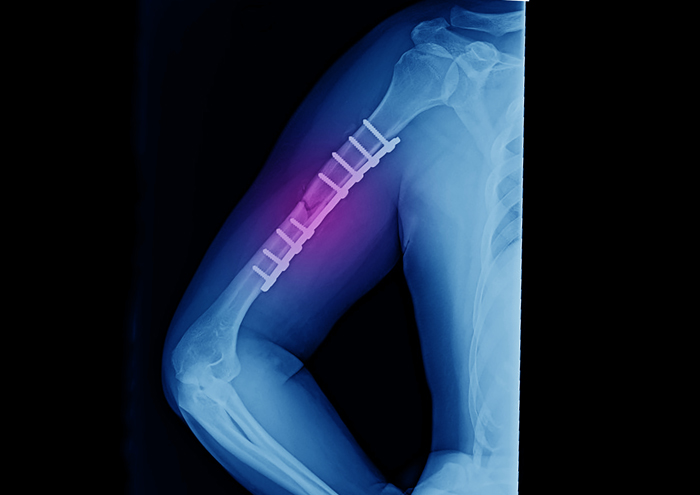Open reduction internal fixation (ORIF) Surgery in Alwarpet, Chennai
Repairing fractured bones or fixing joints can be done in multiple ways, like casts, splint, closed reduction, and open reduction. The open reduction internal fixation is a surgical method used to repair bones that have been fractured into multiple pieces and cannot be treated with simple casts and splints.

About the Open Reduction Internal Fixation (ORIF)
An Open Reduction Internal Fixation or ORIF surgery is performed by orthopedic surgeons, and one can get it done at the best orthopedic hospitals in Alwarpet in Chennai. This surgery can be used to fix fractures in arms, legs, bones in the shoulder, wrist, ankles, hip, and knees. Before your orthopedic surgeon decides to perform an ORIF, they will advise you to undergo a few tests like a complete physical examination, blood investigations, an x-ray, and a CT scan or MRI may be recommended in some cases.
An ORIF surgery is usually performed as an emergency procedure under general anesthesia and is a two-part surgery. In the first part of the surgery, an open reduction is done during which the surgeon makes a cut in the skin, accesses the bone, and tries to restore it to its original position. In the second part of the surgery, the surgeon uses metal hardware like screws, plates, pins, or rods to hold the restored bone parts in place to facilitate healing.
The duration and recovery after an ORIF surgery depend upon the type and complexity of the fracture, overall bone density in the patient, presence, and absence of other medical conditions, age, and general health of the patient.
Who qualifies for an Open Reduction Internal Fixation (ORIF)
An Open Reduction Internal Fixation surgery is not meant for all people with a fracture. It is indicated for people in the following conditions:
- A serious fracture that cannot be treated with a cast or splint
- When the bone is broken into multiple pieces
- The fractured bone is sticking out of the skin
- When the bone is not lined up properly
- A past closed reduction did not successfully heal
- A dislocated joint
Why is the Open reduction internal fixation (ORIF) conducted?
In most cases, an ORIF procedure is done on an emergency basis when a bone is broken into multiple pieces and requires proper visualization to hold the pieces together and facilitate healing. The procedure uses metallic screws, rods, or plates to keep the bones together, and the wound is sutured together.
Request an appointment at Apollo Spectra Hospitals, Alwarpet, Chennai.
Call 1860 500 2244 to book an appointment.
Benefits of Open Reduction Internal Fixation(ORIF)
There are many benefits why orthopedic surgeons opt to perform an Open Reduction Internal Fixation surgery. These include:
- Has a very high success rate
- The patient can return to normal activities after complete recovery
- Due to better visualization and direct access, it provides better accessibility to the surgeon to the fracture site
- It helps to reduce pain and enables proper healing of the fracture site
- Prevents further damage to the bone or joint
Risks or Complications of an Open Reduction Internal Fixation (ORIF)
As with any surgical procedure, an Open Reduction Internal Fixation has a few risks associated with it, and these include:
- Infection due to the metallic components placed during the procedure or from the incision made during the surgery
- Bleeding from the surgical site or the joint
- Blood clot
- Allergy to the anesthetic agent
- Blood vessel damage
- Nerve damage
- Damage to the ligaments and tendons
- Abnormal or incomplete healing of the bone
- Limited or complete loss of mobility
- Muscle damage
- Post-surgical arthritis
- Tendonitis
- Clicking or popping in the joint
- Bone fracture
- Pain in the joint due to the metal hardware placed
- Compartment syndrome due to increased pressure in the extremities
The ORIF surgery is a safe one, but if you have one or more of the following medical conditions, you may develop complications:
- Diabetes
- Liver conditions
- Rheumatoid arthritis
- Obesity
- Tendency and history of blood clots (patients on anticoagulants)
An ORIF surgery is routinely performed at all the best orthopedic hospitals in Chennai. A surgery usually performed as an emergency procedure, ORIF has a very high success rate in treating severe and complex fractures.
The recovery time after an ORIF surgery can take from 3 to 12 months. The duration depends upon the severity of the condition before surgery, the location of the fracture, and if any complications developed after surgery. Physiotherapy or occupational therapy may be recommended as the healing progresses.
Though an ORIF procedure is safe and most cases are successfully treated using it, as with any surgical procedure, there are chances of side effects such as:
- Infection
- Bleeding
- Swelling
- Nerve or blood vessel damage
- Necrosis of tissues in the surgical site
- Stiffness or reduced movement in the joint
The duration of the procedure depends upon the complexity and severity of the fracture, location, and the health of the individual. This two-part procedure can take up to several hours to complete.
An ORIF procedure is always performed under general anesthesia not to feel any pain during the procedure. After the surgery, your surgeon will prescribe pain-relief medications to help you manage the pain during the recovery phase.
Symptoms
Our Top Specialities
NOTICE BOARD
CONTACT US
CONTACT US
 Book Appointment
Book Appointment


.svg)
.svg)
.svg)
.svg)








